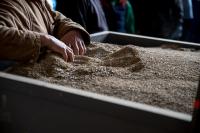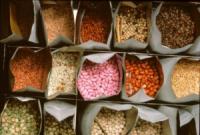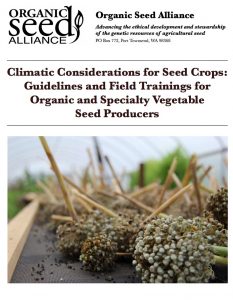eOrganic authors:
Tessa Peters, Organic Seed Alliance
Cathleen McCluskey, Organic Seed Alliance
Table of Contents
- Introduction
- Enterprise Budget Tool, by the Organic Seed Alliance
- Enterprise Budget Tool, by Farm Folk,City Folk and the Bauta Family Initiative
- Recordings of Webinars and Conference Presentations
- Seed Contracting Website and Case Studies
- Seed Contract Examples
- Seed Company Advice and Seed Prices from the Organic Seed Alliance
- Climactic Considerations for Seed Crops
- Labor Tracking Tool for Seed Producers
- Production, Stock and Foundation Seed Planning Tool for Seed Producers
- Organic Seed Producers Directory
- Recordings of Webinars and Conference Presentations on Seed Economics and Contracting
Introduction
The lack of adequate quantities of organic seed is recognized as a weak link in organic production and has resulted in ongoing exemptions to the National Organic Program’s (NOP) organic seed requirement. While organic seed production is a developing industry and a viable economic opportunity for organic growers, there is uncertainty and risk. In particular, seed growers may desire mentorship in enterprise budgeting, record keeping, and marketing strategy. This training aims to help the industry to scale up organic seed production, increase the profits for growers, and build the supply of organic seed nationally through increasing growers' knowledge by making tools and examples available for enterprise budgeting, inventory management, foundation and stock seed planning, and contracting. Scroll down for links to many of the tools and watch the presentations from the 2018 Seed Economics Intensive at the Organic Seed Growers Conference and the 2020 Organic Seed Growers Conference. Funding for the seed economics toolkit was provided by NC SARE and the Montana Specialty Crop Block Grant Program.
Enterprise Budget Tool (Organic Seed Alliance)
 This seed enterprise budget tool was developed to guide farmers who are interested in knowing the costs associated with producing individual seed crops on their farms. Enterprise budgets provide a snapshot of costs associated with a single crop for a single year and do not make predictions or forecasts for future years. However, they can be used to provide guidance for farmers who are considering investments in new equipment, training, or scale. Sensitivity analyses can be done by entering different values for any variable in the production flow. Each value in the tool can be customized, though common default values are provided for some calculations in the current version.
This seed enterprise budget tool was developed to guide farmers who are interested in knowing the costs associated with producing individual seed crops on their farms. Enterprise budgets provide a snapshot of costs associated with a single crop for a single year and do not make predictions or forecasts for future years. However, they can be used to provide guidance for farmers who are considering investments in new equipment, training, or scale. Sensitivity analyses can be done by entering different values for any variable in the production flow. Each value in the tool can be customized, though common default values are provided for some calculations in the current version.
- Download the Organic Seed Alliance Enterprise Budget Tool
- Click here for a video tutorial of how to use the Enterprise Budget Tool
Enterprise Budgeting Tool (Farm Folk City Folk and the Bauta Family Initiative)
 Based on the work of Daniel Brisebois and Richard Wiswall, the BC Seed Security Program at FarmFolk CityFolk and the Bauta Family Initiative on Canadian Seed Security have developed a website to help you help you determine the cost of your labour and material inputs as well as potential sales revenue for seed crops.The website contains a spreadsheet which you can use, and which is being tested by seed growers in British Columbia. Download the tool at http://www.bcseeds.org/business-resources/seed-enterprise-budgets/
Based on the work of Daniel Brisebois and Richard Wiswall, the BC Seed Security Program at FarmFolk CityFolk and the Bauta Family Initiative on Canadian Seed Security have developed a website to help you help you determine the cost of your labour and material inputs as well as potential sales revenue for seed crops.The website contains a spreadsheet which you can use, and which is being tested by seed growers in British Columbia. Download the tool at http://www.bcseeds.org/business-resources/seed-enterprise-budgets/
Sebastian Aguilar's presentation in Farmer Enterprise Budget Case Studies webinar recording below uses this type of tool.
Seed Contracting Website and Case Studies
This website, also developed by FarmFolk CityFolk and the Bauta Familia Initiative, provides three case studies of Canadian farmers who grow seed on contract, provides sample contracts, and best practices: http://www.seedsecurity.ca/en/past-events/501-growing-seed-on-contract-meet-seed-companies-and-local-growers
Seed Contract Examples
- Seed Contract Example: High Mowing Organic Seeds. Click here
- Seed Contract Example: Southern Exposure Seed Exchange. Click here
Seed Contracting Advice and Prices from the Organic Seed Alliance
The Organic Seed Alliance published results of a survey 9 seed companies on best practices for engaging in contract seed production and to inquire about average contract prices for specific crops to help growers develop production plans. Find a summary of results of the survey including companies’ advice to growers and input on pricing here--scroll down to the bottom of the page to view the survey results.
Climactic Considerations for Seed Crops: Guidelines and Field Trainings for Organic and Specialty Vegetable Seed Producers
 This guide provides detailed climatic considerations for organic and specialty seed production in the Pacific Northwest. Topics include environmental influences on pollination and fertilization, and the influence of temperature, day length, frost-free days, precipitation, and wind. The guide also includes sections on environmental management, crop selection for seed production, and the history and geography of seed production in the region.
This guide provides detailed climatic considerations for organic and specialty seed production in the Pacific Northwest. Topics include environmental influences on pollination and fertilization, and the influence of temperature, day length, frost-free days, precipitation, and wind. The guide also includes sections on environmental management, crop selection for seed production, and the history and geography of seed production in the region.
Download the Climactic Considerations for Seed Crops Guide
Labor Tracking Tool for Seed Producers
Tracking on-farm labor can be confusing or overwhelming, but it is also extremely important for growers trying to get a handle on what their operator costs are, or produce enterprise budgets. The forms in this tool are designed as a guide that offers different method for tracking. Three different forms are included in the Labor Tracking Tool for Seed Producers. Each operation (or operator) might prefer a different type of form or a modified version of one of the forms. The first form is designed for operations where a person might track a different operation each day. One form would be used for each operation with a tick mark placed on the type of operation being tracked. The second form is designed for activities that will be performed many times over many dates (such as watering in a greenhouse or screening a large seed lot. The third form is designed to be used by a single operator who will track a number of different activities. Any of these (or all of these) may be useful for tracking labor in a seed production operation. Download the Labor Tracking Tool for Seed Producers
Production, Stock, and Foundation Seed Planning Tool for Seed Producers
 Common questions around foundation, stock, and production seed are: How much foundation seed do I need to ensure I have enough stock seed? How much stock seed should I produce every third year for my production seed? The Production Planning Tool for Seed Producers is a simple excel sheet that helps guide decision making around how much and how often to produce foundation, stock, and production seed based on your operation, desired inventory, longevity of the seed, and estimated yield. A blank template and a real-world example are included as separate worksheets.
Common questions around foundation, stock, and production seed are: How much foundation seed do I need to ensure I have enough stock seed? How much stock seed should I produce every third year for my production seed? The Production Planning Tool for Seed Producers is a simple excel sheet that helps guide decision making around how much and how often to produce foundation, stock, and production seed based on your operation, desired inventory, longevity of the seed, and estimated yield. A blank template and a real-world example are included as separate worksheets.
Download the Production Planning Tool for Seed Producers
Organic Seed Producers Directory
The Organic Seed Alliance produced a directory to connect seed companies and wholesale seed buyers to organic seed producers, and seed growers with each other and prospective seed farm interns. Find it on the Organic Seed Alliance website here.
Recordings of Webinars and Conference Presentations on Seed Economics and Contracting
Seed Economics Intensive Recorded at the Organic Seed Growers Conference: 14 Feb, 2018
Navigating the financial challenge of growing seed commercially can be challenging and managing the risks are essential to success. Beginning and experienced seed growers joined the Organic Seed Alliance for this one-day intensive to explore tools for managing financial risk in commercial seed production through budgeting tools to evaluate capital investments, expand enterprises, and assess market opportunities. We examined real-world examples from seed growers with different marketing strategies to build knowledge of wholesale, retail, contract growing, breeding, and variety maintenance. Presenters had the opportunity to provide their own production examples and work with an agricultural economist to develop enterprise budgets. We also heard from organic seed industry representatives about gaps in the seed supply, best practices for quality control, and essentials for contracting with their organizations. Presenters: Sebastian Aguilar, Chickadee Farm; Travis Greenwalt, Highland Economics; Sam McCullough, Nash's Organic Produce; Tanya Murray, Oregon Tilth; Sarah Kleeger, Adaptive Seed; Tom Stearns, High Mowing Organic Seed; Ira Wallace, Southern Exposure Seed Exchange; Pete Zuck, Johnny's Selected Seeds
Click here for the recordings as a YouTube playlist
Inventory Management: Tessa Peters, Organic Seed Alliance
Seed companies largest risk is embodied in their inventory. A failure to manage inventory is the number one risk for seed businesses. In this presentation, Tessa Peters of the Organic Seed Alliance discusses inventory management strategies including variety lifecycles, marketing as a retail business or a wholesale business, considerations for stewarded varieties, managing foundation, stock, and production seed, and forecasting.
Choosing a Scale and Marketing – Retail case study: Sarah Kleeger, Adaptive Seeds
Sarah Kleeger of Adaptive Seeds gives a behind-the-scenes look at the inner workings of her seed company. She shares the business structure and the percent shares of each of the business costs. She gives insight into managing inventory at her scale including choosing varieties through trails and tastings, providing breeder liberties and intellectual property.
Working with Seed Companies – Wholesale case study: Sebastian Aguilar, Chickadee Farm
Sebastian Aguilar runs a wholesale contracting seed business in California. He gives an inside look at growing crops on contract. Including establishing relationships with seed companies, quality expectations, dealing with cash flow challenges, and investments in equipment.
Enterprise Budgets: Travis Greenwalt, Highland Economics
Travis Greewalt presents an introduction to using the Organic Seed Alliance's Enterprise Budgeting Tool (linked below.) He discusses what enterprise budgets are designed to do and what they are not designed to do. Then he provides a case study of chard seed. Finally, he presents a sensitivity analysis for the chard example in which he provides different price points for and yield estimates for the example to show how an enterprise budget might be used in decision making for your farm.
Tracking Labor: Tanya Murray, Oregon Tilth
Tanya Murray leads a cost study cohort program with Oregon State University and Oregon Tilth. She presents ideas for tracking labor costs on-farm using time studies.
Farmer Enterprise Budget Case Studies: Sarah Kleeger, Adaptive Seeds; Sebastian Aguilar, Chickadee Farm; Sam McCullough, Nash's Organic Produce
Three farmers give real-life examples of how to use enterprise budgets to track costs for specific seed crops. Sarah discusses two squashes (Oregon Homestead Sweet Meat winter squash, Lower Salmon River Squash) and two peppers (Bacskai Feher and Korean hot peppers) using OSA's tool (linked below.) Sebastian presents a Wiswall-based method for lettuce and tomatoes. Sam McCullough presents on two varieties of chard, delivered at different seed cleaning specifications.
A portion of this material is funded in partnership by USDA, Risk Management Agency, under award number RM17RMEPP522C044/4500075419
2020 Organic Seed Growers Conference Recordings: Seed Economics, Balancing Passion and Profitability
Seed growing holds immeasurable value – from the empowerment of adapting crops to thrive in a region to the urgent need for genetic and cultural preservation to the potential for increasing on-farm habitat. For many growers seed is a calling and makes agronomic sense in a diverse farming system, but the economics of seed must also be considered to ensure economic sustainability. This session will share tools developed by an agricultural economist working with farmers to track production costs and assess profit-ability. Panelists will include experienced and beginning seed producers across a range of crops, scales, geographies, and business models. Discussion will focus on how to use economic tools to make decisions in seed production and how these growers balance their assessment of the economic, environmental, and personal values of growing seed on farm. This moderated panel will include ample time for audience ques-tions and honest exploration of the challenges and rewards of life as a seed grower. View the playlist of all the recordings here.



